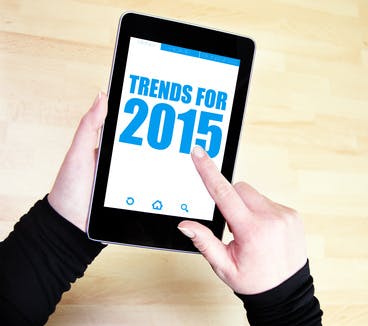Global economic growth and the resounding need to engage employees in all parts of the globe dominated HR headlines in 2014. But as one year closes and another one moves ahead, it’s time to once again predict what is in store for 2015.
Here are three (3) distinct HR trends that we fully expect to headline conversations in the new year. You’ll see that the common thread in these trends is the emphasis on new technologies and innovations that will drive the HR industry forward.
From benefits technology to leveraging big data to better understanding your employees, 2015 will bring with it sophisticated new technologies and methods for HR, which, if approached correctly, will be a win for all parties.
1. More innovation in attraction and retention of talent
Employee engagement is one trend that will transition from 2014 into the new year, but it will become more complex. Workforces are shifting, and now, companies are looking for ways to engage very different demographics, from Millennials to the aging baby Boomer workforce.
According to a recent study, Millennials will become the largest generation in the U.S. workforce, and 28 percent of Millennial respondents said that they are already in management positions. At the same time, in 2015, one in every five American workers will be over 65, according to the U.S. Bureau of Labor Statistic.
So what does all this mean? In short, when it comes to employee engagement, one size does not fit all. For example, a Millennial may care more about a flexible work-life balance, while the older generation cares more about health care benefits.
As a result, companies will need to take a step back and evaluate the ways in which they motivate employees, revisit health care programs to ensure that they are meeting employee needs and shift to models that analyze productivity to stay competitive and attract new talent. This will require looking at each generation of employee and considering their preferences.
The good news is that today, it’s not just salary that satisfies employees’ needs, it’s unique benefit offerings and a strong sense of company culture. All employees want to be a part of a large organization but still have the direct, customized communication on their benefits and rewards programs to make them feel like valued members of the team.
2. The impact of mobile on HR
Mobile has changed the way employees work, as they have become highly reliant on these devices and the apps within them.
Smartphones are attached to employees at all times, providing them with the ability to work remotely from the comfort of their homes. This can be extremely helpful for employees with children, as well as for the frequent business traveler.
But the true impact of mobile in the next year is its ability to connect employees at any moment, and the implications this has on incorporating benefits and rewards programs into a person’s everyday life.
Gartner predicts that 2015 will be the year that mobile phone sales will reach 1.95 billion — around 70 percent of which will be smartphones – and this market will continue to surpass the sale of laptop and desktop PCs in the coming years . Mobile-optimized HR software allows employees to access benefits and rewards packages from virtually anywhere. They can check on accrued vacation time quickly and easily when planning their next vacation, or know what their hospital benefits are when they get rear-ended on said vacation.
Instant access to their information provides employees with a sense of control and puts them at the heart of their rewards program.
Another big influence on this trend is the emergence of Millennials into the workforce at a rapid pace, which was part of the first trend above. Millennials are a generation that is glued to their phones – sending an average of 181 texts a day, according to Mobile Marketer – forcing organizations to change the way they communicate with their employees. Having HR processes that are easily accessed on any mobile device is crucial to keep employees informed and connected to their benefits and rewards.
3. Big Data and HR
As HR continues to move away from tedious paper-based processes, we will see greater emphasis placed on data projections and analytics.
Companies are increasingly turning to data to understand employee interactions and productivity. From observing new employees during their first few days at a company to identifying areas for improvement, analytics will be used to pinpoint inefficiencies and streamline workflow processes.
Imagine having the ability to see, for example, that employees are most productive between 9 am and 2 pm Tuesday-Thursday. This information can encourage management teams to set internal deadlines for immediately after that time block on each of those days to ensure projects are completed in the most efficient manner.
Or, perhaps you can see that certain training programs result in positive changes, while others don’t seem to make a difference to employee development. It is clear that data obtained from these devices has the potential to optimize workflow and easily track an employee’s productivity level and sense of engagement.
From the benefits and rewards perspective, there will be many exciting developments in 2015, especially as wearables, such as the upcoming debut of the Apple iWatch, infiltrate the workforce. Today, many companies offer benefits for people who are gym members – but not everyone is comfortable at the gym or can make time for one. Wouldn’t it be great if employees could get discounts on their health insurance, for example, if they could prove that they exercised a certain amount via a personal health tracker?
Bottom Line: Tech adoption a must for HR in 2015
It’s probably not a huge surprise that technology advancements will be a driving factor in HR’s evolution in the next year.
But what will be interesting is how quickly companies adopt these solutions for their own employees. Those that decide to move full speed ahead will likely see an immediate positive response from their workforce.
